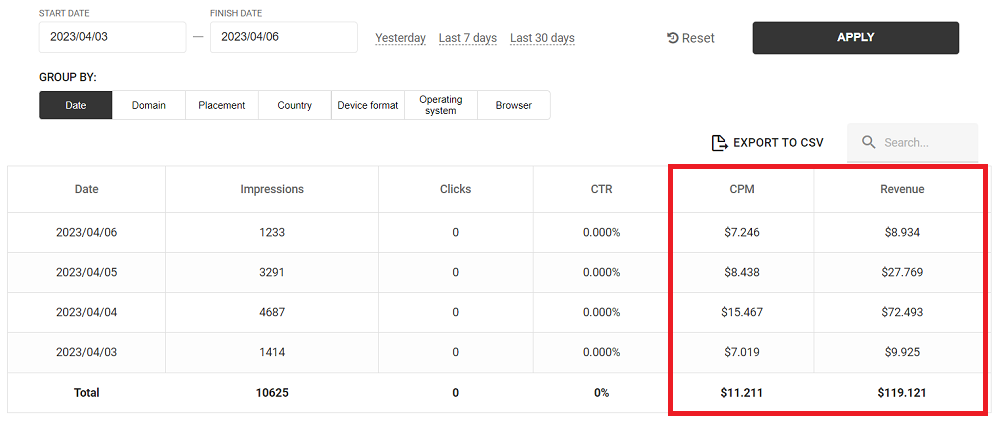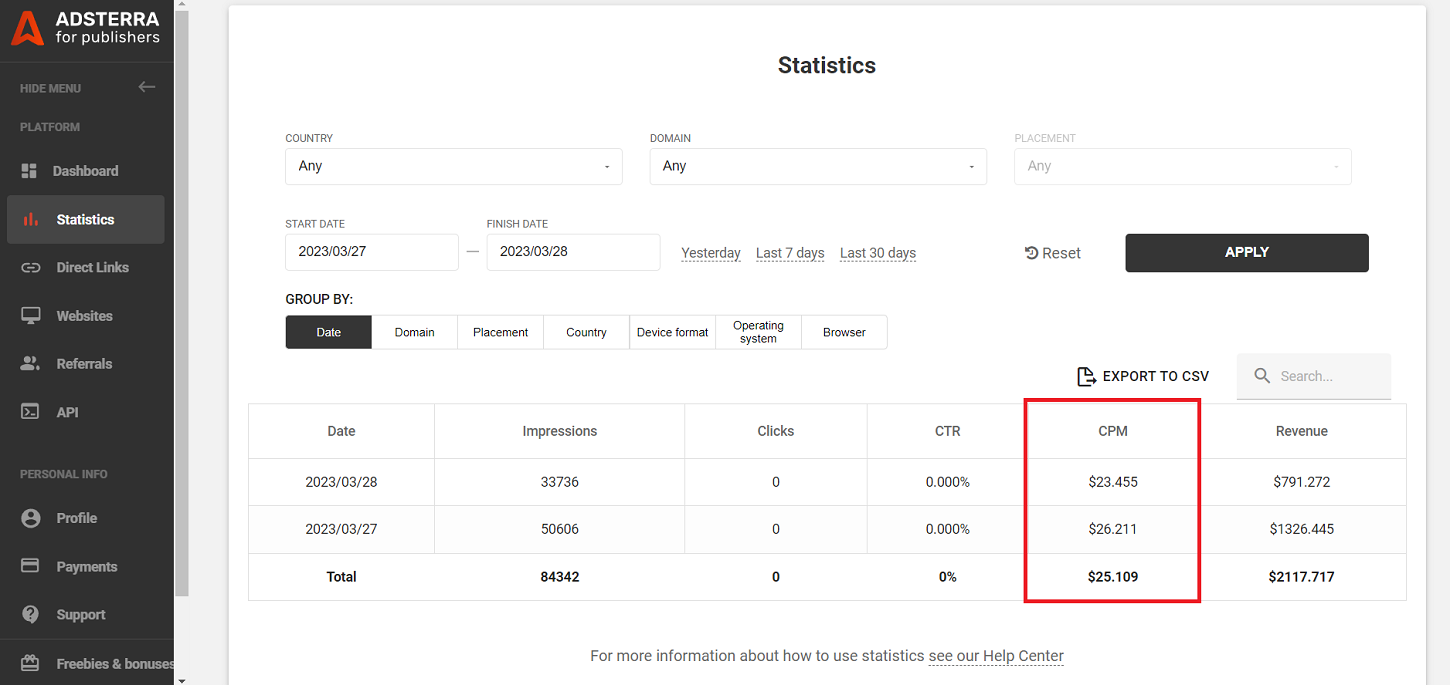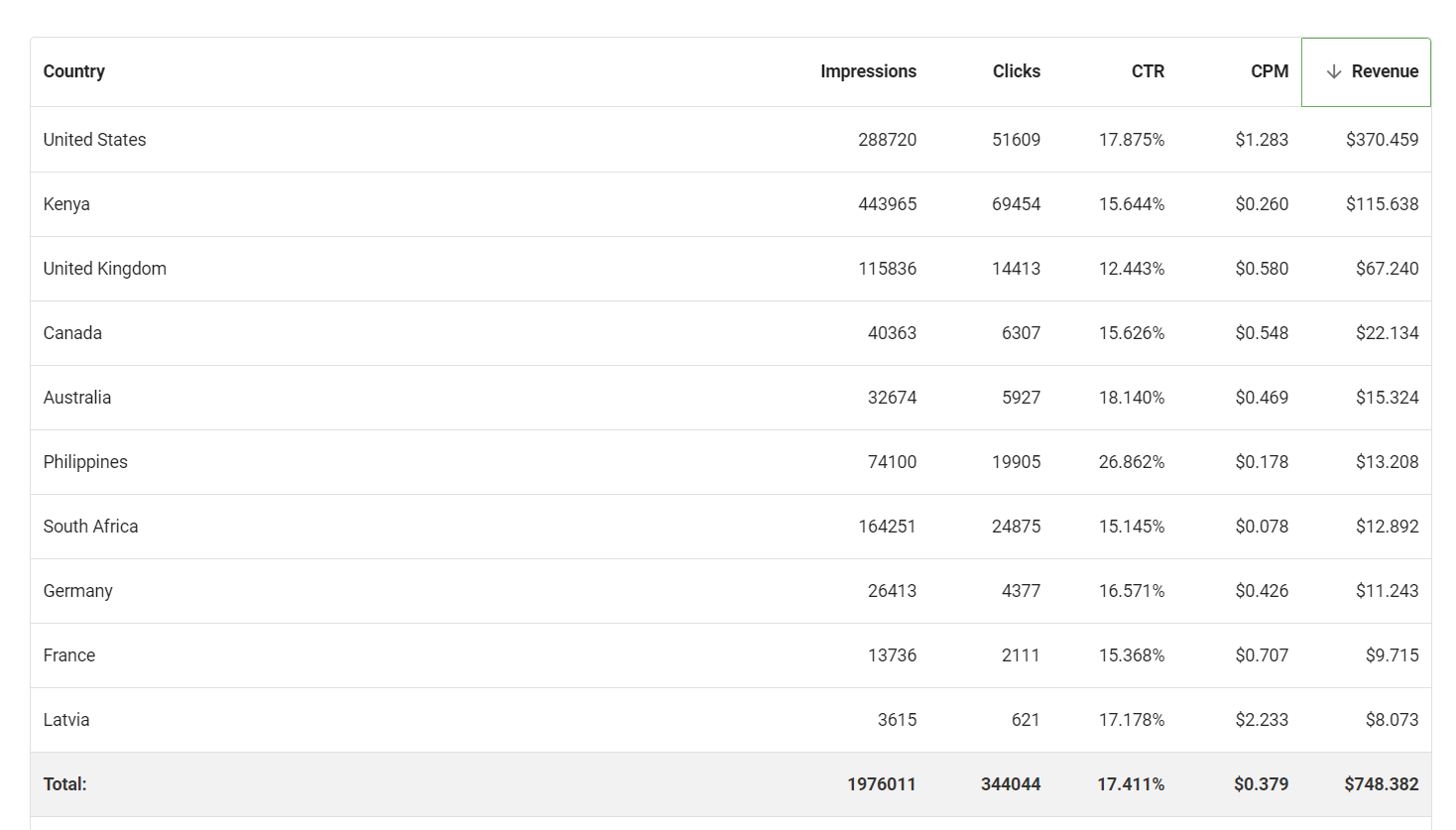Publishers look for high CPM rates which depend on the cost of Adsterra 1000 impressions. Yet, a website’s traffic volumes don’t always return equal numbers of ad views. It’s time to get things in order!
From this short guide, you will learn about how much Adsterra pays for 1000 views and how you can improve CPM rates without even increasing the number of website visitors. After reading, you will be all set to shift your monetization strategy to a new level.
How are Adsterra 1000 impressions linked to CPM payout rates?
Ad networks start paying for every 1,000 views when you place ads on your website. But not only. Your payout rates hinge on the number of clicks and user actions. This way, a publisher’s CPM and revenue will depend on the price per ad view, pay-per-click rates, and conversions.
In your Adsterra publisher’s account, the CPM rate includes all types of payouts. Conversions and clicks are the highest-paid, so you might see your CPM soar one day and decrease the next day. All those payouts will be distributed per 1,000 impressions. It’s also called “effective CPM” (eCPM,) or earnings per 1,000 impressions.
The eCPM rate counts all types of a publisher’s earnings (ad views, clicks, conversions) obtained within 1K of ad impressions.
How Adsterra counts 1000 ad impressions for publishers
At Adsterra, we count impressions exactly as other ad networks do. Every impression is equal to one full load of an advertisement on a web page.
If 5 website visitors have seen one ad on one page, you get 5 impressions. The same will happen if a visitor has seen 5 different ads while navigating your website. And the same will happen if one visitor has seen one ad five times.
It sometimes happens that impressions are not scored, and now, we’re going to make this issue clear.
Views vs. impressions, or how to avoid discrepancies
Your Adsterra earnings per 1000 views equal every 1000 of the full advertisement load. So, the ad is counted as viewed when:
- it loads fully, and users can observe more than 50% of the banner;
- a user doesn’t leave the page before contacting with this ad.
Publishers who manage website metrics always use Google Analytics to track traffic. They might notice that GA4 marks high figures for the number of visits while on Adsterra, they see fewer ad impressions. This is called a discrepancy.
Ad discrepancy: Why your ad network’s stats show fewer impressions
It’s natural when you see some minor changes in stats. A discrepancy of 10–15% is ok, since every platform uses its own algorithm of counting user sessions. But what if you send massive traffic, but get much fewer impressions? Here are some common reasons and methods to combat discrepancies:
1. Users close Popunders before they load
We remember that one impression is a fully loaded ad. So, when users close a new browser tab with ads (aka Popunder) before it loads, it can’t be counted as an impression.
2. Native Banners are visible at less than 50%
Suppose a user doesn’t scroll your page enough to see native ads. This case is frequent when publishers put native banners right before the page footer. The ads are loaded, but much fewer people scroll the page to reach them.
3. Users massively use VPNs and proxy
Some advertisers decline anonymous traffic; that’s why some ad impressions won’t be scored.
4. Zero tolerance to bots
Adsterra doesn’t count false impressions and bot clicks. Not the same but very much alike: remnant traffic bought in bulk also shows poor performance. Advertisers detect and blacklist such ad views.
As you can see, you only must take care of traffic quality and ad placement to avoid losing potential money. What else can affect your payouts?
What must a publisher know about ad impressions quality when sending traffic to an ad network to monetize a full blast?

From my point of view, when sending traffic to an ad network to fully monetize through a blast, publishers must ensure high-quality ad impressions. Key factors include:
Optimization: Continuously analyze and optimize ad placements and formats to improve click-through rates and conversions.
Audience Relevance: Ensure the traffic is relevant to the ads being served. Targeting the right audience increases engagement.
Viewability: Ads must be positioned where they are easily seen by users. Higher viewability rates lead to better monetization.
Ad Fraud Prevention: Verify that traffic is genuine and not from bots or fraudulent sources, as this affects ad network trust and earnings.
User Experience: Avoid overwhelming users with too many ads. Maintain a balance for better engagement and long-term results.
CPM calculator: How the CPM rate affects publishers’ incomes
When your CPM is $2, it means your Adsterra 1000 impressions now cost $2. Ok, but how much can you earn, then? Another example will help us to make it out.
Calculating the CPM price
Supposing your website gets 5,000 visitors per day. These users generate 10,000 page views per day (they can see many pages or reload the same page). Your ad network’s stats show you the CPM of $2. Then, your daily revenue formula will be: 10,000 pageviews / 1,000 (the cost per thousand impressions) = $10. You got 10 CPMs, meaning you’ll be paid $2 ten times. In total, you get $20 per day for one single website. On average, it’ll be $600 monthly, a pleasant addition to your advertising revenue.
Remember that the CPM payout rates also include conversions! So, today you may have the $2 payout, and the next day $0.2: only because your visitors stopped converting. And the following day will bring you $4, just because users converted more!
Stats below reveal how a publisher managed to get $100+ in just 4 days by driving quality traffic. Not so many ad views, as you may have noticed. No clicks or CTR since our partner earns from Popunders only.

Another example is provided by a website owner whose strategy was to drive social traffic to his website. Loads of relevant Popunder ad views returned enhanced profits.

You can now see how CPM rates affect the amount of money earned. But how exactly does the price per 1000 views count? Why does one publisher from India enjoy a CPM of $25 while others with the same geo can only make $0.2? To find the answer, we must look at those who pay publishers — the advertisers.
Who decides on the cost of 1,000 impressions?
One can first think that ad networks alone establish how much they will pay for ads exposed on publishers’ websites. But this is not like that. Now we will explain all the ins and outs.
Advertisers are those who set the CPMs for publishers. They come to an ad network to promote their goods and services. All they need is their ads to reach as many users as possible. But not all users: only those who buy products, install apps, or subscribe to digital services. This is called targeting. Advertisers set the preferable user parameters like country, city, device type, OS, etc.
How do advertisers determine your Adsterra earnings?
When advertisers choose which traffic to buy, they decide on the price (aka bid). Advertisers may be ready to pay much for, say, mobile users from the USA, but only if they get relevant audiences, which means:
- People view ads
- They click on ads
- They purchase goods and services
Advertisers also determine the pay per click rate and the CPA (pay per action) price according to their preferences. So, views and clicks from the USA are traditionally paid higher than those from Pakistan. However, if your visitors from Pakistan deliver multiple conversions, your CPM may soar overnight.
All these facts state the same truth: payout rates change from day to day. Let’s check the main factors affecting CPMs and publishers’ revenues.
Factors that can affect CPM rates along with traffic volumes
Publishers notice their CPM can spike one day, drop the next day…and lift again. Several factors affect the price of traffic. Publishers can monitor the dynamics right in their account on the Publishers Statistics page. Now, we are moving to listing some key factors associated with volumes and defining CPMs.
It all depends on the volume of ad offers and the competition. Advertisers compete stiffly during the BFCM sales (and others). And if your GEO is in their target, your CPM may skyrocket.
It makes sense to analyze how your traffic changes during the hottest sales seasons to attract more users that will convert into income.
1. Website niche
Advertisers have always paid higher for ads on some trending website categories: News, Movies, Entertainment, and Sports. This doesn’t mean you must rebuild the blog to match the fruitful niche. If you drive quality traffic, you’ll find your fans among advertisers.
* Merchants also bid higher for sports-related websites during sports events, UFC fights, world tournaments, etc. When it comes to the off-season, the cost can decrease.
2. CTR or click-through rate
This metric means almost as much as CPM. It can tell a publisher how the audience reacts to ads. If users click ads, advertisers will normally pay higher for such users. The higher the click-through rate, the more valuable your website is.
Publishers can amplify their CTRs by following some common tips. First, it is better to place ads on the most visible spots of the web pages. Also, website owners should focus on the nativity of advertising slots, especially when it comes to mobile pages. In our previous guide, we listed a bunch of tips on how you can improve your CTRs.
3. Seasonality
Seasonality is obvious, though, the most unpredictable factor. Sometimes, advertisers buy all traffic, careless of the cost, paying as much as possible. Other times, they set the lowest bids.
Seasonality is all about the competition for this or that traffic slice (targeting). Advertisers compete fiercely during the BFCM or Christmas sales. And if your geos are in their target, your CPM may skyrocket. The same happens during the major sporting events.
It makes sense to analyze how your traffic changes during the hottest sales seasons to attract more users that will convert into income.
4. Ad offers and ad filters
Widely, you think of attracting quality traffic. And that’s enough for making money. However, we can look deeper and discover traffic segments which have always delivered the highest payouts.
Non-mainstream advertisers have always paid a lot for their offers to be displayed on publishers’ websites. Speed dating platforms, iGaming offers, anime games, all of these are non-mainstream or niche offers. And if your visitors are grown-ups (21+) that are looking for entertainment content, you should remove filters from explicit ads and try making money from such ads, as well.
Traffic types that boast of having higher revenues from every 1,000 impressions deserve higher attention! Let’s see which ones are trending now.
Highly paid traffic types
Social traffic
Social traffic is among the best-paid types. Many advertisers are ready to invest a lot for their offers to be exposed to young, advanced, and tech-savvy Meta, TikTok, or YouTube users. As of our recent data slices, up to CPM for the US social traffic can hit $28-50.
Mobile traffic
Universally, more and more users are shopping, learning, and working from mobiles. The COVID-19 outbreak has only fueled this trend. If your Google Analytics continues to expose the dominance of desktop users, it seems like you will soon need a new plan.
SEO optimization under the Core Web Vitals is the primary step in achieving a good influx of organic mobile traffic. But only if you can offer precious, valuable content.
One more tip is a Webview creation. Webviews transform websites into mobile apps. Well, not literally, but they make them much more usable. One condition here: your inventory must be responsive by design.
iGaming and sports traffic
The iGaming vertical is experiencing a huge boost. Lots of games are promoted online while sports platforms attract millions of users willing to support their favorite teams. If you feel your audience has potential to like iGaming and sports ads, try accepting all advertising offers on your site or blog. You’ll be able to remove them later if needed.
Extra factor: traffic whitelists
Whitelisting is not about traffic types but is tightly connected with selecting the best sources and increasing their CPMs.
Advertisers are brilliant in cost optimization. They can either spotlight your website or a specific placement on it, setting a higher CPM, or decrease the bid if they see your traffic is performing poorly.
Your job is to stay in the whitelist—a list with the highest CPM payout rates. So, keep track of the traffic quality and monitor key metrics: impressions, clicks, CTR, CPM, and revenue. Group stats by country to find your breadwinners. If you’re monetizing with Banners ads, group stats by placement to find the best ad slots.

How publishers can increase revenue from Adsterra 1000 impressions
The first and the main point to learn is that the cost of 1,000 ad impressions rate is not exactly the revenue. It’s all about traffic quality, its relevance, and the competition for ad views. Still, you can increase your gains if learning the basic rules of the fair game.
1. Grow traffic that converts
Make sure you know WHO visits your website and how long they spend drilling down your web content. Even massive traffic can return insufficient revenues if it doesn’t react to advertising. Earlier, we shared definitive guides on how to generate huge traffic and how to grow traffic that converts.
Keep an eye on the seasonal spikes and drops of traffic. If you get fewer visits during the leading seasonal sales like Christmas or Black Friday / Cyber Monday, then, probably, your CPM will drop precisely on these dates.
2. Get more Tier 1 and Tier 2 traffic but keep an eye on trends
This trend doesn’t seem to fade. Tier 1 users (US, UK, CA, AU, etc.,) are the most valuable, and advertisers are more willing to bid higher for their products being exposed to these users.
South African (ZA), Indonesian (ID), and Indian (IN), and Vietnamese (VN) traffic has excelled gaining CPMs comparable to ad impressions on Tier 1. Lot of hot offers are promoted here. We also notice explosive demand in LatAm ad views, specifically from Brazil, Colombia, Peru, Chile.
We at Adsterra are also witnessing how Tier 3 traffic gains value for advertisers. Our partners earn a lot on Kenyan and Nigerian traffic. Offer range is impressive, from PIN Submits to App, VPNs, and Sweepstakes.
3. Invest in social traffic
Traffic from social networks is on the rise. It literally spiked in the CPM rates, moving publishers from this niche to the top of the Adsterra money makers ratings.
TikTok and Facebook users consume apps, VPN, software, and e-commerce ads better. Publishers that can attract traffic from these networks can enjoy CPMs that are two- or three-fold higher.
Moreover, you don’t even need a website to start earning money if you drive social media traffic. One landing page with valuable content and a Direct Link URL on it will be enough.
4. Refresh traffic and ad placements
Active and loyal users are a publisher’s main asset. But what if they come to your website daily and meet the same block of banners placed on the same places?
Try refreshing your web page structure off and on. Combine codes, avoiding oversaturation with the same sizes of banners.
Attract new website visitors who can interact with advertisements over and over again. Loyal readership is great, but such users get tired of the same ad placements pretty fast.
5. Use ad formats that appeal to users
It is easier said than done, right? Which formats are out-of-date, and which are better only for desktops? Which ones your users will click and which ignore? One can’t give a rock-solid guarantee that your website visitors will fall for a Popunder or ignore Native Banner. It’s all about A/B tests and regular user behavior checks.
Novelties can add some hundreds of dollars to your income. Social Bar is your trusted partner in traffic monetization. Fresh, neat, UX- and OS-friendly creatives from top advertisers fit any website, whether it is a blog or a catalog, desktop or mobile, iOS or Android-oriented. Read our guide to Social Bar to get all monetization tricks.
Summary
As with any ad network, the cost of 1,000 impressions on Adsterra depends on several factors. And publishers can actively work on improving CPM rates by:
- combining ad formats;
- researching and adding brand-new ad codes;
- fusing websites with relevant traffic;
- investing in mobile and social traffic;
- boosting websites’ download speed and mobile-friendliness, etc.
- ensuring ads are visible to users.
Every next 1,000 impressions will pay you dividends. And remember: you’re not alone in this journey! With Adsterra’s 24/7 live support, every publisher, regardless of the website traffic volume, gets expert advice on making the most of traffic!
Adsterra 1000 impressions FAQs
Adsterra impressions refer to the number of times your visitors view this or that ad. We only count an impression once the ad is fully loaded. Please be aware that we do not count proxy, VPN, or Tor traffic, as advertisers block such anonymous views. Additionally, some of your visitors may be using AdBlock, which can result in a 10-15% lower count of impressions compared to your daily visitor count.
Drive traffic to your website or generate social traffic to achieve 1,000 of ad views. Every 1K of ad views will be paid, taking into account all user actions: views, clicks (except for Popunder), and conversions. Clicks and conversions are usually paid higher than impressions.
Firstly, it depends on your traffic volume. If your average daily blog visits count from 10,000 unique users, you will start getting paid faster. Secondly, the ad placement means a lot. Adsterra will count fully loaded and fully viewed ads. So, your blog visitors mustn’t close the package before the content is loaded.
You can target any demographics and geos while creating content and generating traffic. Moreover, many publishers who monetize sports traffic, send ad views from almost all countries. Adsterra will adjust ad offers to match your audiences’ interests.
Adsterra is a great starting point for all websites that generate high-quality ad views and deliver conversions. As we include payouts for conversions in your revenue, you can gain higher profits even with fewer ad impressions.
As an ad network, Adsterra can’t increase the number of ad impressions on your website, but we share workable tips and tricks for improving CPM rates, as well as case studies with detailed instructions to nail your monetization strategy.
